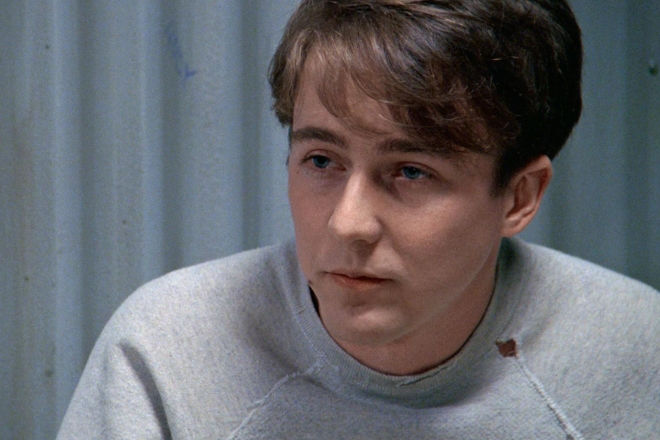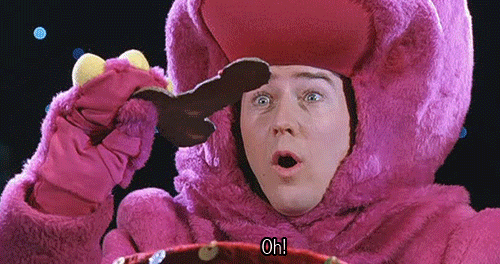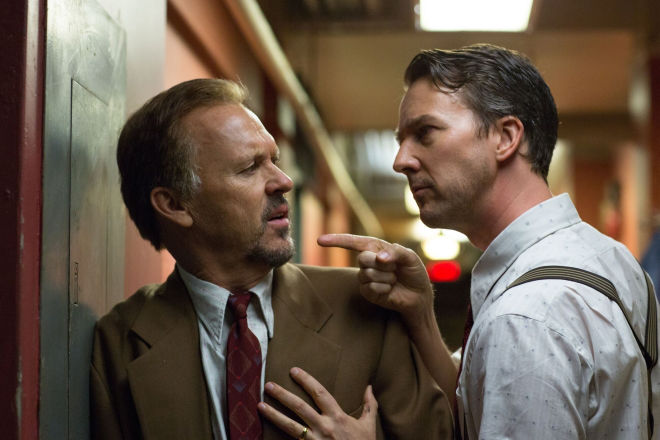Why Isn’t Anyone Celebrating The Edward Nortonaissance?
How a blacklisted dramatic actor came back as a comedy favourite.

Everybody loves a comeback. From March of 2011 (around the time of The Lincoln Lawyer’s release) to March of 2014 (when Matthew McConaughey won his Best Actor Oscar for Dallas Buyers Club), the internet tracked with intense scrutiny the so-called “McConaissance“, heralding the phoenix-like rise of a fallen, once-promising actor to the upper echelons of Hollywood. Somehow, Matthew McConaughey — the star of Failure to Launch — became the people’s champion.
And yet, a similar resurrection narrative has gone largely ignored (and no, I’m not talking about the ‘Gaby Hoffmanaissance’, though how fucking lucky are we for that?). I’m speaking of the ‘Edward Nortainaissance’. (The Edwakening? The Norturn?)
With little fanfare, this month’s Oscar nominations announcement validated years of hard graft by Norton to reclaim his former glory, cemented by a nod for Best Supporting Actor, and key roles in two Best Picture contenders: Birdman and The Grand Budapest Hotel.
The world at large responded thusly: ¯\_(ツ)_/¯
See, unlike McConaughey, Edward Norton never slummed it with Kate Hudson, nor earned a name for nude, late-night bongo sessions. Some would say, degree of difficulty-wise, McConaughey’s ascent was more impressive.
But Norton’s homecoming is indeed a massive deal. Sure, he seemingly strolled into the cinematic wilderness of his own stubborn volition, having gained a reputation for hard-headedness and being controlling of projects not assigned to his control. But consider the circumstances he’s returned from. After leading 2008’s Marvel misstep The Incredible Hulk, Norton only appeared in three movies before 2012: box office flops Pride and Glory, Leaves of Grass and Stone. He had a cameo in The Invention of Lying as well… which flopped majorly too.
2012 was a step in the right direction, but it hardly revitalised his career. He had supporting roles in Wes Anderson’s Moonrise Kingdom (which would pay off grandly in years to come) and The Bourne Legacy (a spin-off no one likes nor remembers). Nonetheless, that same year saw the release of The Avengers, in which Mark Ruffalo replaced him as The Hulk, and that movie was kind of a hit, so 2012 wasn’t exactly a victory for the dude.
Also worth remembering: this marks the second comeback by Norton, and surely these things become exponentially difficult.

–
The Rise And Fall Of Edward Norton, Dramatist
To take you back to 1996, the unknown 27-year-old made his feature debut in Primal Fear, scoring an Oscar nomination for Best Supporting Actor by playing the (spoiler alert) Machiavellian altar boy accused of murder. After nabbing further prizes for Everyone Says I Love You, The People vs. Larry Flint and Rounders, he grabbed his first Best Actor Academy Award nod for American History X.
So far, his was a charmed career. But evidence of his difficult nature behind the scenes was beginning to emerge, with American History X director Tony Kaye falling out with Norton over the course of the production. Norton took over as editor and Kaye was ousted, describing his new enemy to Entertainment Weekly as “a narcissistic dilettante.”
The next few years were promising enough for Norton, with arguably his two greatest movies: Fight Club and 25th Hour. He also directed his first and only flick: the charming, thoughtful Keeping the Faith. Sadly, things got bad pretty soon after, a downfall you can trace back to a role in 2002’s notorious Death to Smoochy.

What followed was forgettable fare like Kingdom of Heaven, Down in the Valley and The Painted Veil. Needless to say, no one was tipping him to play The Hulk, even for a studio that had recently bet big on the very-recently rehabbed Robert Downey Jr. But he was invited back to the blockbuster fold by Marvel, and cast as the lead in The Incredible Hulk.
While the film disappointed at the box office, there were bigger reasons why Norton was left out in the cold when The Avengers assembled four years later. The actor famously butted heads with the studio over the picture’s running time (he was pushing for 135 minutes; they wanted it under two hours). Rumours spread that Norton wouldn’t publicise the film if he wasn’t happy with the abridged cut. Despite his public dispute of such claims, it was all too easy to believe the obstinate actor of making the threat.
Marvel President Kevin Feige didn’t pull punches when announcing Norton wouldn’t be back for The Avengers, saying in a statement, “our decision is definitely not based on monetary factors, but instead rooted in the need for an actor who embodies the creativity and collaborative spirit of our other talented cast members.”
Norton responded (publically at least) rather graciously. “I am so appreciative of the outpouring of support from fans…. I am very grateful to Marvel for extending the offer and even more so for giving me the chance to be part of the Hulk’s long and excellent history.” His agent was, erm, less gracious. “Feige’s statement is unprofessional, disingenuous and clearly defamatory. Mr. Norton’s talent, tireless work ethic and professional integrity deserve more respect, and so do Marvel’s fans.”
The damage was done. One of our generation’s most promising dramatic actors had squandered the biggest opportunity of his career.
So, how did he finagle an invite to the 2015 Academy Awards? By becoming one of our finest comedic actors.
–
The Rise Of Edward Norton, Comedian
Accepting a cameo in 2009’s The Invention of Lying may have actually been the first prong of an ingenious re-positioning strategy, as it preceded a guest appearance on Modern Family, another cameo in The Dictator, and, eventually, a surprising stint hosting Saturday Night Live in 2013.
During that well-reviewed SNL gig (during which he promoted nothing – fact is, he didn’t even have a credited project to his name in 2013) he brilliantly spoofed old mate Wes Anderson, and at least made enough friends to get invited back in 2014 — albeit, in a sketch cut for time.
Most impressive, he appeared in The Lonely Island’s music video for ‘Spring Break Anthem’, which opens with a truncated episode of Between Two Ferns. That’s a double dose of modern comedy royalty, and they’re all hanging with Ed-Norts.
All those moves made it so much easier to imagine the neo-Nazi from American History X yukking it up, which is why, in 2014, we didn’t even blink when curb-stompin’ ‘Derek Vinyard’ himself appeared in Anderson’s The Grand Budapest Hotel (admittedly, playing a friendly, Nazi-esque soldier) and Alejandro González Iñárritu’s Birdman. It’s because of his performance in the latter that Norton is now in the running for the Best Supporting Actor Oscar; his first time back at the big dance since 1999. He plays volatile thespian Mike Stamper, whose self-seriousness and devotion to “the truth” seems likely to ruin the Broadway show being staged by Michael Keaton’s character, Riggan Thomson. Iñárritu clearly prods Norton to skewer his reputation in this backstage black comedy as much as he’s urging Keaton — a former superhero star just like Riggan — to spoof his own.

Both actors give wonderfully self-immolating turns; Norton, especially, willingly lets himself seem like an unrepentant, abusive asshole with a (literal) boner for acting. Perhaps his triumphant rebirth has been overshadowed by that of Keaton, whose own resurrection narrative is being giddily lapped up by Oscar voters. But Keaton’s always been down for whatever.
So spare a thought for Norton, who in 2014 finally shed fifteen years of baggage and re-emerged as a wonderful comic presence. Here’s hoping, this time, the comeback sticks.
–
Simon Miraudo is an AFCA award-winning writer and film critic. He is also co-host of The Podcasting Couch and tweets @simonmiraudo